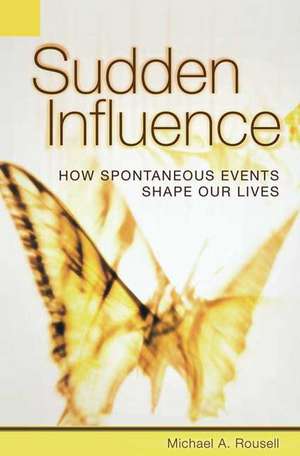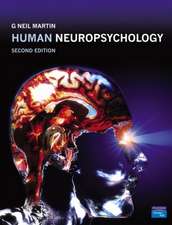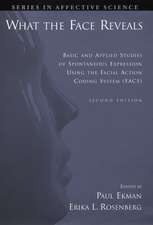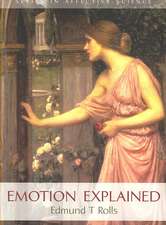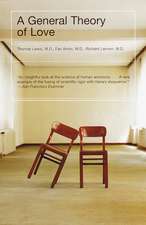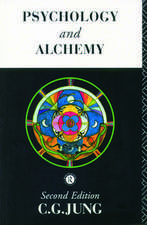Sudden Influence: How Spontaneous Events Shape Our Lives
Autor Michael A. Rousellen Limba Engleză Hardback – 29 apr 2007 – vârsta până la 17 ani
Preț: 307.47 lei
Preț vechi: 374.84 lei
-18% Nou
Puncte Express: 461
Preț estimativ în valută:
58.83€ • 61.60$ • 48.80£
58.83€ • 61.60$ • 48.80£
Carte tipărită la comandă
Livrare economică 09-23 aprilie
Preluare comenzi: 021 569.72.76
Specificații
ISBN-13: 9780275993214
ISBN-10: 0275993213
Pagini: 208
Dimensiuni: 156 x 235 x 24 mm
Greutate: 0.48 kg
Editura: Bloomsbury Publishing
Colecția Praeger
Locul publicării:New York, United States
ISBN-10: 0275993213
Pagini: 208
Dimensiuni: 156 x 235 x 24 mm
Greutate: 0.48 kg
Editura: Bloomsbury Publishing
Colecția Praeger
Locul publicării:New York, United States
Notă biografică
Michael A. Rousell is a Counseling Psychologist and also holds a doctorate in philosophy. He has spent 15 years studying spontaneous influence events. His work has included adolescent counseling, family and marriage therapy, addictions, and forensics. He has also taught across the spectrum from elementary, junior high, and high school to college undergraduate and graduate programs.
Recenzii
When he was a young student who hated school--and on one occasion ranted and raved about the injustices of school and the inhumanity of teachers--a teacher told Rousell that he could only change the system if he became a teacher. This statement/event had a dramatic, profound, and lasting effect on Rousell: he is now a counselor with a PhD in philosophy and professional experience in all levels of education. He has devoted 20 years to researching what he labeled the Spontaneous Influence Event (SIE) he experienced--a phenomenon many have experienced--and that research culminates in this present book. Rousell identifies five elements of an SIE: the perceived authority of the influencer, rapport with the influencer, dependence on the influencer, absorption in imagery on the part of the person influenced, and emotional arousal. These need not occur spontaneously, and the author presents a methodology in which these elements can be managed so as to create an SIE for the purpose of bringing out the potential in an individual. Including chapter notes, this is a stimulating, innovative, and practical book for anyone--teachers, counselors, parents, physicians, managers, social workers--working to tap potential in others. Highly recommended. All readers, all levels.
Rousell, a counseling psychologist with a doctoral degree in philosophy, has published his interesting book at a happy moment. Rousell's 20 years of research on what he calls spontaneous influence events (SIE) attempt to give solid grounding to the old adage Mighty oaks from little acorns grow. To Rousell, simple words or actions, heard or received when we are in an emotionally charged state, can be life-transforming in a way well beyond their apparent meaning. Rousell's work includes examples and proofs of the merits of his argument, as well as advice for both making use of such SIE moments and helping to create them for others. This book has a kind of counterpart in Nassim Nicholas Taleb's Black Swan and other recent works that emphasize the role of suddenness, chance, and influence-a kind of happy coincidence not unlike his own events. For most collections.
Causal remarks, such as those referred to in prefatory remarks by a U. of Oregon professor, can have a life-changing impact on a listener's self-esteem. Based on extensive study of the phenomenon of spontaneous influence events (SIEs), a psychologist explains how SIEs can lead to new ways of thinking by disarming our usual defense mechanisms. Rousell's treatment focuses on clinical and anecdotal examples, but he does relate the resultant elevated suggestibility state to research on the placebo effect. The book includes exercises to reinforce personal strengths.
An easy read that includes numerous examples of sudden influence events, their perception, management, and overall importance in learning both inside and outside of the classroom. Occasionally bordering on a manual on how to manipulate potentially traumatic learning events, Rousell's description of the role of hypnosis in education, and emphasis on the importance of creating linkages between information and feelings are timely and intriguing. Sudden Influence is an excellent invitation into the important and fascinating world of neurobiological learning and a valuable addition to every well-stocked, educational reference library.
Rousell, a counseling psychologist with a doctoral degree in philosophy, has published his interesting book at a happy moment. Rousell's 20 years of research on what he calls spontaneous influence events (SIE) attempt to give solid grounding to the old adage Mighty oaks from little acorns grow. To Rousell, simple words or actions, heard or received when we are in an emotionally charged state, can be life-transforming in a way well beyond their apparent meaning. Rousell's work includes examples and proofs of the merits of his argument, as well as advice for both making use of such SIE moments and helping to create them for others. This book has a kind of counterpart in Nassim Nicholas Taleb's Black Swan and other recent works that emphasize the role of suddenness, chance, and influence-a kind of happy coincidence not unlike his own events. For most collections.
Causal remarks, such as those referred to in prefatory remarks by a U. of Oregon professor, can have a life-changing impact on a listener's self-esteem. Based on extensive study of the phenomenon of spontaneous influence events (SIEs), a psychologist explains how SIEs can lead to new ways of thinking by disarming our usual defense mechanisms. Rousell's treatment focuses on clinical and anecdotal examples, but he does relate the resultant elevated suggestibility state to research on the placebo effect. The book includes exercises to reinforce personal strengths.
An easy read that includes numerous examples of sudden influence events, their perception, management, and overall importance in learning both inside and outside of the classroom. Occasionally bordering on a manual on how to manipulate potentially traumatic learning events, Rousell's description of the role of hypnosis in education, and emphasis on the importance of creating linkages between information and feelings are timely and intriguing. Sudden Influence is an excellent invitation into the important and fascinating world of neurobiological learning and a valuable addition to every well-stocked, educational reference library.
